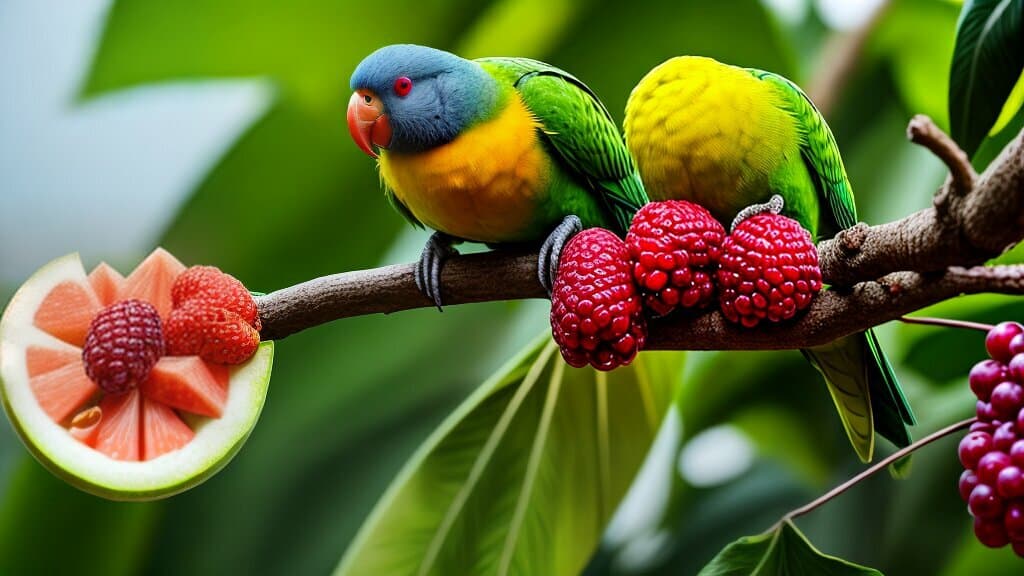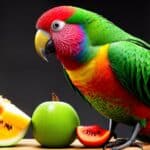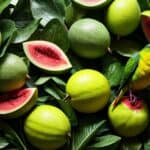Kakarikis are known to be energetic and playful parrots. As a responsible pet owner, you must know what foods they can and cannot eat to keep them healthy. One common question that many pet owners ask is whether kakarikis can eat cantaloupe. In this article, we will explore the dietary needs of kakarikis and answer this question.
Can Kakarikis eat cantaloupe? Yes, Kakarikis can safely eat cantaloupe. As fruit eaters in the wild, they are well-adapted to consuming a variety of fruits. Cantaloupe, being rich in vitamins A and C, can contribute to a balanced diet. However, removing the seeds is important, as these can potentially cause harm. Always ensure to serve the cantaloupe in manageable sizes for the Kakariki to consume easily, and consider it as part of a varied diet that includes a mix of fruits, vegetables, and parrot-specific feeds.
Key Takeaways:
- Kakarikis are playful parrots that require a balanced and healthy diet to thrive.
- Feeding your kakariki parrot the right foods is essential for maintaining their health and well-being.
- Kakarikis can eat various fruits and vegetables, but some foods should be avoided.
Kakarikis’ Dietary Needs and Safe Foods
Pet owners often ask about the dietary needs of their feathered companions, especially when it comes to parrots like kakarikis. These friendly birds require a well-balanced diet to maintain optimal health, and it’s essential to provide them with varied and nutrient-rich foods.
Kakarikis’ Dietary Requirements
Kakarikis’ diets should consist of high-quality pellets, supplemented with fresh fruits, vegetables, and seeds. The pellets should comprise about 70-75% of the bird’s diet, with the remainder comprising fresh produce and seeds.
It’s important to note that kakarikis have a high metabolism and require food frequently. They may consume up to 10% of their body weight in food each day, and they tend to prefer grazing on small meals throughout the day.
Safe Foods for Kakariki Parrots
Kakarikis can enjoy a wide range of fruits and vegetables, including leafy greens, carrots, sweet potatoes, apples, bananas, and berries. It’s crucial to ensure that the produce is fresh and washed thoroughly before serving it to your feathered friend.
While feeding your kakariki fresh foods, you should avoid avocado, chocolate, caffeine, alcohol, and anything with high fat, salt, or sugar. These foods can be toxic to birds and lead to serious health issues.
Feeding Your Kakariki Parrot
When feeding your kakariki fresh foods, providing various options is essential to ensure a balanced diet. You can offer fruits and vegetables in their natural form or chop them into smaller pieces for ease of feeding.
It’s also a good idea to introduce new foods gradually, allowing your bird to adjust to the new tastes and textures. You can offer new foods alongside familiar items to encourage your bird to try them.
Make sure to remove any uneaten fresh foods from your bird’s cage after a few hours to prevent spoilage and bacterial growth.
Conclusion
You can ensure that your kakariki parrot maintains optimal health and well-being by providing a well-balanced diet with high-quality pellets and fresh fruits and veggies. Remember to avoid offering toxic foods and gradually introduce new items for a varied and enjoyable diet.
Can Kakarikis Eat Cantaloupe?
Kakarikis are known for their varied and colourful diets, consisting of fruits, vegetables, seeds, and nuts. However, not all fruits are safe for them to eat. If you’re wondering whether or not your pet kakariki can eat cantaloupe, the answer is yes! Cantaloupe can be a healthy addition to their diet when given in moderation.
Like all fruits, it’s important to introduce cantaloupe slowly and in small quantities to avoid digestive issues. Also, remove any seeds from the fruit, as they can be a choking hazard for your bird. Cantaloupe is a rich source of vitamins A and C, essential for maintaining your kakariki’s overall health and well-being.
However, it’s important to note that cantaloupe should not be your kakariki parrot’s sole source of nutrition. Variety is key in their diet, so provide a balanced mix of fruits, vegetables, and other safe foods.
Healthy Snacks for Kakarikis
Kakarikis love snacking on fruits, but not all fruits are safe. It’s important to provide a balanced diet that meets their nutritional needs while offering healthy and enjoyable treats. Here are some great options:
| Food | Benefits |
|---|---|
| Berries (strawberries, raspberries, blueberries) | Rich in antioxidants and vitamins |
| Apple slices | Contain fibre and vitamin C |
| Banana pieces | Provide potassium and vitamin B6 |
| Papaya chunks | High in vitamin A and digestive enzymes |
| Watermelon cubes | Full of hydration and vitamin C |
It’s important to note that fruits should be given in moderation and not make up most of a kakariki’s diet. Offer them as treats or snacks between meals.
Another tip is to offer a variety of textures and flavours to keep your kakarikis interested and engaged. For example, try freezing some fruit pieces or stuffing them inside a foraging toy for an added challenge.
Always research before giving new foods to your kakarikis, and consult with a veterinarian if you have any concerns about their dietary needs.
Conclusion
Feeding your pet kakariki a balanced diet is crucial for their overall health and longevity. While cantaloupe can be a nutritious addition to their diet, it is important to feed it in moderation and always ensure it is properly washed and prepared.
Remember to also include a variety of safe fruits and vegetables, as well as high-quality pellets, in their daily diet to provide them with the necessary nutrients. Offering healthy snacks, such as a slice of apple or carrot, can also be a great way to keep your kakariki happy and stimulated.
By understanding their dietary needs and preferences, you can ensure your kakariki is receiving a well-rounded and satisfying diet to help them thrive.
FAQ
Q: Can Kakarikis Eat Cantaloupe?
A: Yes, kakarikis can eat cantaloupe. It is safe and healthy for them.
Q: Can kakarikis eat other types of melon?
A: Yes, kakarikis can eat a variety of melon including watermelon, Galia and Cantaloupe. Check out our article Can Kakarikis Eat Melon? for more information.
Q: What are Kakarikis’ Dietary Needs and Safe Foods?
A: Kakarikis have specific dietary needs, and certain foods are safe. Some safe fruits for kakarikis include apples, bananas, and berries. It’s important to feed them a balanced diet that includes a variety of fruits and vegetables.
Q: Can Kakarikis Eat Cantaloupe?
A: Yes, kakarikis can eat cantaloupe. It is safe and healthy for them. Cantaloupe is a great source of hydration and contains vitamins A and C, which benefit their overall health.
Q: What are Healthy Snacks for Kakarikis?
A: There are several healthy snacks that you can feed your kakarikis. Some examples include leafy greens like spinach and kale, cooked sweet potatoes, and unsalted nuts. It’s important to avoid giving them any sugary or salty snacks as they can harm their health.
In Summary
In conclusion, kakarikis can safely eat cantaloupe, which can be a healthy addition to their diet. However, feeding them a balanced diet that includes other fruits and vegetables is important. Additionally, healthy snacks will help keep them happy and healthy.



Have comments or questions about this article? Then get involved!
Spotted an error or something we have missed? Let us know